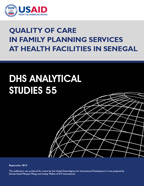- PUBLICATIONS
- JOURNAL ARTICLES
- ACCESS PUBLICATIONS
Publications Summary
- Document Type
- Analytical Studies
- Publication Topic(s)
- Family Planning
- Country(s)
- Senegal
- Language
- English,French
- Recommended Citation
- Assaf, Shireen, Wenjuan Wang, and Lindsay Mallick. 2015. Quality of Care in Family Planning Services at Health Facilities in Senegal. DHS Analytical Studies No. 55. Rockville, Maryland, USA: ICF International.
- Download Citation
- RIS format / Text format / Endnote format
- Publication Date
- September 2015
- Publication ID
- AS55
